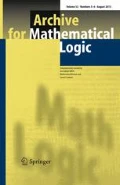Abstract
Given a countable transitive model of set theory and a partial order contained in it, there is a natural countable Borel equivalence relation on generic filters over the model; two are equivalent if they yield the same generic extension. We examine the complexity of this equivalence relation for various partial orders, focusing on Cohen and random forcing. We prove, among other results, that the former is an increasing union of countably many hyperfinite Borel equivalence relations, and hence is amenable, while the latter is neither amenable nor treeable.
Similar content being viewed by others
Data Availibility Statement
All data relevant to the present work is contained herein
Notes
We do not really need M to be countable; for a given partial order \({\mathbb {P}}\), it suffices that \({\mathcal {P}}({\mathbb {P}})\cap M\) is countable in \({\mathbf {V}}\). In particular, we could allow M to be a transitive class in \({\mathbf {V}}\), such as when \({\mathbf {V}}\) is a generic extension of M after sufficient collapsing, or \(M={\mathbf {L}}\) under large cardinal hypotheses. In such cases, only the proofs of Lemmas 2.6 and 2.9 need alteration, instead relying on Theorem 2.16.
Being hyperfinite is a \(\Sigma ^1_2\) property in the codes, but whether it is \(\Sigma ^1_2\)-complete, and thus not absolute for countable models, appears to be unknown.
We would like to thank the anonymous referee for clarification on this point.
As per footnote 1, we may allow \(\omega _1\subseteq M\), provided \(|{\mathcal {P}}({\mathbb {B}})\cap M|=|{\mathcal {P}}({\mathbb {R}})\cap M|\) is still countable in \({\mathbf {V}}\). In this case, M will be \(\mathbf {\Sigma }^1_2\)-correct by Shoenfield absoluteness (Theorem 25.20 in [13]).
References
Adams, S.R., Spatzier, R.J.: Kazhdan groups, cocycles and trees. Am. J. Math. 112(2), 271–287 (1990)
Clemens, J., Coskey, S., Dworetzky, S.: The classification of countable models of set theory. MLQ Math. Log. Q. 66(2), 182–189 (2020)
Dobrinen, N., Friedman, S.-D.: Homogeneous iteration and measure one covering relative to HOD. Arch. Math. Logic 47(7–8), 711–718 (2008)
Dougherty, R., Jackson, S., Kechris, A.S.: The structure of hyperfinite Borel equivalence relations. Trans. Am. Math. Soc. 341(1), 193–225 (1994)
Feldman, J., Moore, C.C.: Ergodic equivalence relations, cohomology, and von Neumann algebras. I. Trans. Am. Math. Soc. 234(2), 289–324 (1977)
Gao, S.: Invariant Descriptive Set Theory. Pure and Applied Mathematics, vol. 293. CRC Press, Boca Raton (2009)
Grigorieff, S.: Intermediate submodels and generic extensions in set theory. Ann. Math. 2(101), 447–490 (1975)
Habič, M.E., Hamkins, J.D., Klausner, L.D., Verner, J., Williams, K.J.: Set-theoretic blockchains. Arch. Math. Logic 58(7–8), 965–997 (2019)
Hamkins, J.D.: On \({V}\)-decisive and weakly homogeneous forcings. MathOverflow. https://mathoverflow.net/q/184806 (version: 2017-04-13)
Hayut, Y., Karagila, A.: Restrictions on forcings that change cofinalities. Arch. Math. Logic 55(3–4), 373–384 (2016)
Hjorth, G., Kechris, A.S.: Borel equivalence relations and classifications of countable models. Ann. Pure Appl. Logic 82(3), 221–272 (1996)
Jackson, S., Kechris, A.S., Louveau, A.: Countable Borel equivalence relations. J. Math. Log. 2(1), 1–80 (2002)
Jech, T.: Set Theory. Springer Monographs in Mathematics. Springer, Berlin (2003). The Third Millennium Edition, Revised and Expanded
Jech, T., Shelah, S.: A complete Boolean algebra that has no proper atomless complete subalgebra. J. Algebra 182(3), 748–755 (1996)
Kechris, A.S., Miller, B.D.: Topics in Orbit Equivalence. Lecture Notes in Mathematics, vol. 1852. Springer, Berlin (2004)
Kunen, K.: Set Theory. Studies in Logic and the Foundations of Mathematics, vol. 102. North-Holland, Amsterdam (1980)
Maharam, D., Stone, A.H.: Realizing isomorphisms of category algebras. Bull. Austral. Math. Soc. 19(1), 5–10 (1978)
Marks, A.S.: Uniformity, universality, and computability theory. J. Math. Log. 17(1), 1750003 (2017)
McAloon, K.: Consistency results about ordinal definability. Ann. Math. Logic 2(4), 449–467 (1970/1971)
Moschovakis, Y.N.: Descriptive Set Theory, Volume 155 of Mathematical Surveys and Monographs, 2nd edn. American Mathematical Society, Providence (2009)
Popa, S.: Cocycle and orbit equivalence superrigidity for malleable actions of \(w\)-rigid groups. Invent. Math. 170(2), 243–295 (2007)
Royden, H.L.: Real Analysis, 3rd edn. Macmillan Publishing Company, New York (1988)
Rudin, W.: Real and Complex Analysis, 3rd edn. McGraw-Hill, New York (1987)
Slaman, T.A., Steel, J.R.: Definable functions on degrees. In: Cabal Seminar 81–85, Volume 1333 of Lecture Notes in Mathematics, pp. 37–55. Springer, Berlin (1988)
Solovay, R.M.: A model of set-theory in which every set of reals is Lebesgue measurable. Ann. Math. 2(92), 1–56 (1970)
Sullivan, D., Weiss, B., Wright, J.D.M.: Generic dynamics and monotone complete \(C^\ast \)-algebras. Trans. Am. Math. Soc. 295(2), 795–809 (1986)
Thomas, S.: Martin’s conjecture and strong ergodicity. Arch. Math. Logic 48(8), 749–759 (2009)
Thomas, S.: Popa superrigidity and countable Borel equivalence relations. Ann. Pure Appl. Logic 158(3), 175–189 (2009)
Thomas, S., Schneider, S.: Countable Borel equivalence relations. In: Cummings, J., Schimmerling, E. (Eds.) Appalachian Set Theory 2006–2012, Volume 406 of Lecture Notes Series, pp. 25–62. London Mathematical Society (2012)
von Neumann, J.: Einige Sätze über messbare Abbildungen. Ann. Math. (2) 33(3), 574–586 (1932)
Vopěnka, P., Hájek, P.: The Theory of Semisets. Academia (Publishing House of the Czechoslovak Academy of Sciences), Prague (1972)
Zapletal, J.: Forcing Idealized. Cambridge Tracts in Mathematics, vol. 174. Cambridge University Press, Cambridge (2008)
Zimmer, R.J.: Ergodic Theory and Semisimple Groups. Monographs in Mathematics, vol. 81. Birkhäuser, Basel (1984)
Acknowledgements
I would like to thank Samuel Coskey, Joel David Hamkins, Andrew Marks, and Simon Thomas for many helpful conversations and correspondences that contributed to this work.
Author information
Authors and Affiliations
Corresponding author
Additional information
Publisher's Note
Springer Nature remains neutral with regard to jurisdictional claims in published maps and institutional affiliations.
Rights and permissions
About this article
Cite this article
Smythe, I.B. Equivalence of generics. Arch. Math. Logic 61, 795–812 (2022). https://doi.org/10.1007/s00153-021-00813-3
Received:
Accepted:
Published:
Issue Date:
DOI: https://doi.org/10.1007/s00153-021-00813-3


